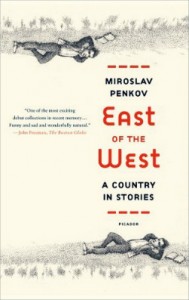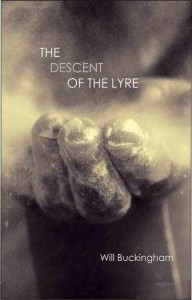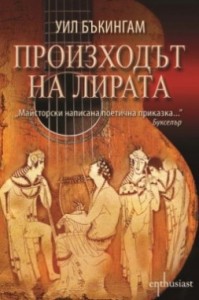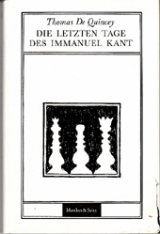Miroslav Penkov’s “East of the West” is a collection of short stories written by the Bulgarian-born (1982) author that lives as an assistant professor of English in Denton/Texas. Penkov writes in English.
A grumpy old man (in ‘Makedonija’) in a nursing home in Communist Bulgaria, just outside of Sofia. He is taking care of his wife who is seriously handicapped after two strokes. Only the visits of his daughter and grandson give his life some structure beside the nursing home routine with its meager meals:
“Dear God, I remember eating better during the Balkan war.”
The radio – we write the year 1969 – reports the news that are sarcastically commented by the protagonist:
“The Communist Party is great again, more jobs for the people, less poverty. Our magnificent Bulgarian wrestlers have earned even more gold. Good night comrades, be safe in your sleep.”
What makes the story different and interesting from other stories of old people in similar circumstances is that the husband discovered recently that his wife was keeping a secret from him during all the years of their marriage. Hidden in a box she kept a diary in the form of love letters written by a young man whom she intended to marry in her youth. But the man perished in the fights of the Bulgarian komitatshi against the Ottoman Turks in the Macedonia of 1905.
The romance between this colorful war hero and the protagonist’s wife happened long before the narrator first met her. So technically there is no reason to be jealous. And yet – did she love him more than she loved her later husband (who blames himself to have always been a coward during his life)? An embarrassing question that even the young grandson raises once the protagonist decides to read the letters aloud to his wife. Yes, he is jealous and he wishes to be that other man who wrote such love letters to his wife while fighting so bravely against the Turks. The narrator feels a huge gap between himself and the war hero – he the peasant son always tried to avoid trouble, he who didn’t go to war (his brother went gladly), he who didn’t join the Communist fighters in 1923 that were preparing the so-called November uprising (his brother did and paid with his life for it), he who pretended not to recognize his dead brother and who forced his own mother to do the same because he was afraid of retributions if they did, he who stoically waited the regimes coming and going, just trying to protect his family from the cold hand of history.
But something strange happens to me as a reader here. While in the beginning I admire the war hero for his courage and devotion which seems to contrast very favorably with the alleged cowardice of the narrator, it dawns on me while the story is unfolding that protecting your loved ones, being there for them when they need advice or a strong shoulder to lean on (like the protagonists daughter whose marriage is falling apart), or taking care of your handicapped wife every minute of the day requires another kind of courage that maybe the war hero didn’t have. Sure, it is more glamorous to be a romantic war hero than to wipe your drooling wife’s mouth with a napkin when she tries to keep her food, or when you try to console your only child that is losing herself as a result of the failed marriage of hers with words and gestures that seem to be utterly inadequate but that as it turns out have nevertheless a soothing effect.
This first masterful story sets the tune in Penkov’s book. Many of the stories describe the life of Bulgarians in a time of transition. They make plans, like the young man in “East of the West” who grows up in a village on the Serbian border and who after he lost his whole family travels to Belgrade to finally marry the girl with whom he is in love since his youth. They learn English in order to provoke their communist grandfathers and use the first opportunity to run away to America (“Buying Lenin”). But their plans turn out to fail, or even worse: they can realize their (usually escapist) desires and end up as homesick emigrants in some small godforsaken town in rural Texas (“Devshirmeh”). None of them seems really happy, and when in one story everything seems to be fine for the protagonist and his Japanese wife (“A picture with Yuki“), fate is striking and from one moment to the next everything turns upside down.
There is a great sadness and melancholy in almost all these stories. A sadness and melancholy that is familiar to me and which seems so typical for many of my wonderful Bulgarian friends. But even in its sad stories, this book is not free of hope, a very nice humor, sometimes full of sarcasm but also of tenderness. And almost all stories teach you a lesson: sometimes you have to lose almost everything in your life – because this means that you also lose the ties that bind you to a place, to people, to situations that prevent you from being really free, from really embarking on to new horizons. Or as ‘Nose’, the hero of ‘East of the West’, the story that gave the book the title says after a terrible disappointment:
”I’ve never felt so good before,” I say, and mean it…I am no river, but I’m not made of clay.”
I very strongly recommend this wonderful book. If you want to get a flavor of Bulgaria, or just read a collection of touching, masterfully written stories, this is the book for you.
You can find additional information on the author’s website:
Miroslav Penkov: East of the West, Farrar, Straus and Giroux 2011
Other reviews:
Fiction Writers Review
Electric Literature
Full Stop
ZYZZYVA
BYT Book Club
largehearted boy
© Thomas Hübner and mytwostotinki.com, 2014. Unauthorized use and/or duplication of this material without expressed and written permission from this blog’s author and/or owner is strictly prohibited. Excerpts and links may be used, provided that full and clear credit is given to Thomas Hübner and mytwostotinki.com with appropriate and specific direction to the original content.








 Facebook
Facebook RSS
RSS Twitter
Twitter